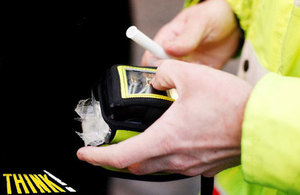Driving with a hangover can land you with a criminal record
THINK! highlights the risks of driving the morning after a big night out.

Policeman with breathalyser.
- an estimated 740 drink drive accidents in 2013 took place in the morning
- around 5,500 people fail a breath test in the morning each year – an average of 15 per day
- 58% of people who drink 4 or more pints on a big night out admit to driving the morning afterwards, with only 1 in 3 of those aware that they could be over the limit
With the busiest night for Christmas parties looming this Friday (18 December 2015), new research from THINK! highlights the risks of driving the morning after a big night out.
An estimated 740 reported drink drive accidents took place in the morning in 2013, with around 5,500 people failing breath tests between 6am and midday every year.
The new figures show that 58% of people who have four or more drinks on a night out sometimes take the risk and drive the following morning, with only a third (33%) aware that they could still be over the limit.
Even though a drink driving conviction can lose drivers their jobs, the most common reason for getting behind the wheel after a heavy night of drinking was to get to work (37%).
Road Safety Minister Andrew Jones said:
Getting behind the wheel after a big night out is a risk that drivers just should not take. Not only are they putting themselves in danger, they also endanger others and their actions can destroy lives.
The safest way to make sure that your Christmas celebrations this year don’t end badly is to wait until you are sober before you think about driving.
Suzette Davenport, National Police Chiefs’ Council lead said:
The majority of drivers are aware that driving whilst impaired by drink or drugs is not worth the risk, but some do not think about how they will get home or to work the morning after a night out.
Thinking ahead about getting home or to work safely the following morning is crucial and potentially if you are driving the morning after drinking you may need alternative travel arrangements. Driving under the influence is never worth the risk to yourself, to your future and to those you could injure or kill.
On average it takes around one hour for the body to break down one unit of alcohol, meaning it could take as long as 12 hours for the alcohol from four pints of higher strength beer (or four large glasses of wine) to leave your system.
Research suggests drivers are unaware of the dangers, with a third (33%) of people surveyed mistakenly think that drinking water would make them safer to drive, along with sleeping (28%) and eating a large meal (21%).
Additional information:
Research note: Interviews were conducted with 781 drivers aged 18 and over in England and Wales from 17 to 19 November 2015, using OnLineBus, the TNS internet omnibus survey.
There are strict penalties if you are convicted of drink driving, including:
- a minimum 12 month driving ban
- a criminal record
- a hefty fine
- up to 6 months in prison
- an endorsement on your licence for 11 years
Calculations based on advice on NHS Choices:
One unit is equivalent to 10ml or 8g of pure alcohol. There are roughly:
- 2.1 units in a standard glass (175ml) of average-strength wine (12%)
- 3 units in a large glass (250ml) of average-strength wine (12%)
- 2 units in a pint of low-strength lager, beer or cider (3.6%)
- 3 units in a pint of higher-strength lager, beer or cider (5.2%)
- 1 unit in a single measure of spirits (25ml)
Roads media enquiries
Media enquiries 0300 7777 878
Switchboard 0300 330 3000